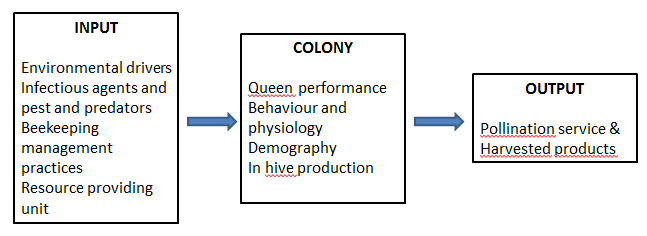Workshop "The health status of a managed honey bee colony"
Background
The way that stressors (mainly biological, chemical and environmental) affect honey bees (Apis mellifera) and contribute to losses in bee populations is poorly understood. The underlying mechanisms remain unclear due to the complex nature of the potential combinations and permutations of stressors acting simultaneously and the effects of interactions between them. In this context, EFSA seeks to develop an integrated risk assessment approach for bees taking into account the multifactorial aspects of honey bee colony losses and weakening.
Information is already available on attributes that influence and/or determine the health status of a honey bee colony, as well as approaches and methodologies that assess the health status of honey bees. However, there is a need for a harmonised framework defining the indicators that should be measured when assessing the health status of a managed honey bee colony in large field surveys, that are agreed upon (and practical to implement) by stakeholders and feasible when applied at regional, national or international levels. This would result in more harmonised data collections in field surveys and hence facilitate meta-analysis and the inclusion of data in risk assessments. This framework should include indicators related to the honey bee colony itself as well as inputs affecting the health status of the colony and thus measuring the effects of the main biological, chemical and environmental stressors that affect the health status of a managed honey bee colony in a holistic manner. The approach considers a dynamic flow of inputs and outputs in the colony (figure 1).
To define what is meant by a “healthy honeybee colony” and how the health status of a honey bee colony could be assessed in a robust and harmonised manner, EFSA is developing a scientific opinion that:
- identifies and defines the main attributes of a healthy honey bee colony;
- establishes a framework that could be used to allow robust and harmonised measurement of the health status of a honey bee colony in field surveys;
- assesses the availability of methods/tools for measuring indicators of honey bee colony health in field surveys.

Figure 1: General framework to assess the health status of a honey bee colony in a holistic manner.
Objectives of the event
Stakeholders may provide valuable input on the work done so far by offering practical views and/or scientific evidence not yet taken into account by the working group. Stakeholders will have an opportunity to comment and suggest improvements on a draft scientific opinion.
This call for interest to participate in the stakeholder event is open to people representing national governmental organisations, non-governmental organisations (NGOs), industry organisations, academia, national reference laboratories, beekeeping organisations, and other bodies involved in bee health. Participants will be selected from the submitted expressions of interest (see link below) based on their expertise and affiliation type. Representing (preferably international) “umbrella” organisations will be considered an asset. Documented involvement in international collaborations on honey bee health is required. The selection of participants will also seek to obtain a balance between persons with different expertise and types of affiliations. Around 20 people will be selected to participate in the event.
The draft opinion will be provided to the selected participants in mid-February 2016 and written comments will have to be submitted by mid-March 2016. Comments that need further clarification will be scheduled for discussion during the event. On-line registrations are closed. Experts who have been selected to participate will be contacted in the coming days. Late requests to participate should be directed to conferences [at] efsa.europa.eu (conferences[at]efsa[dot]europa[dot]eu).
Logistical information
The meeting will be held in Brussels, Belgium, on 13 April (all day) and 14 April 2016 (morning). Further details on the venue and logistics will be communicated to applicants selected to participate. English will be the official language of the event; no translation will be provided.
There is no fee for the event, but participants will be required to cover expenses related to their travel and accommodation.